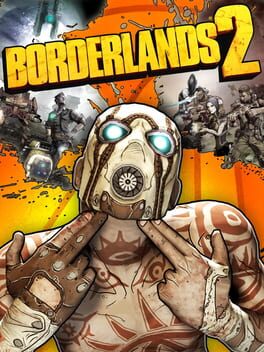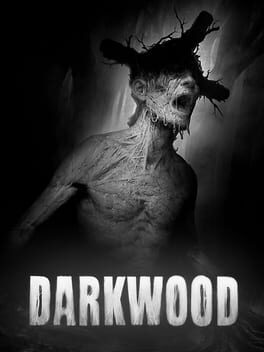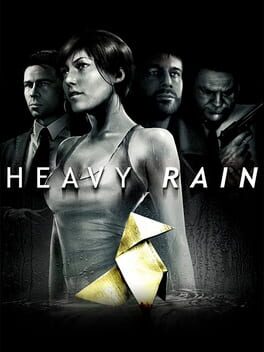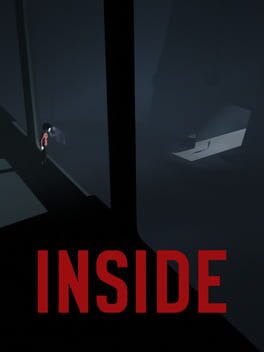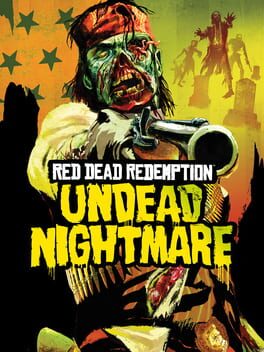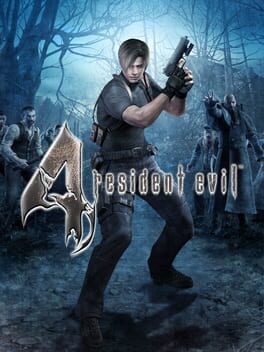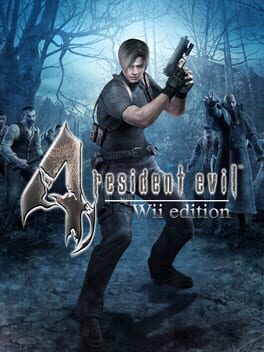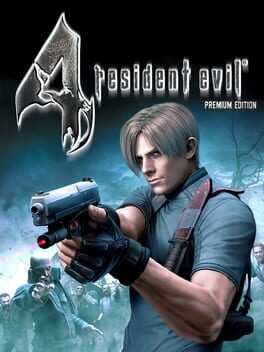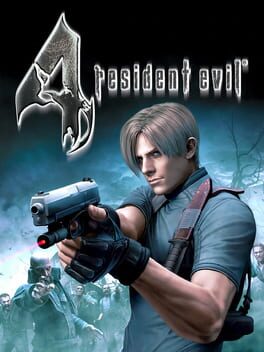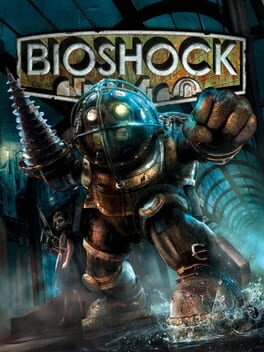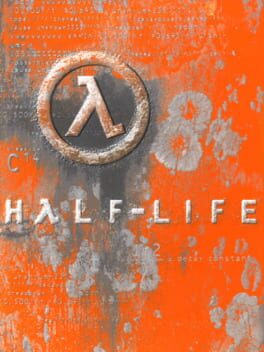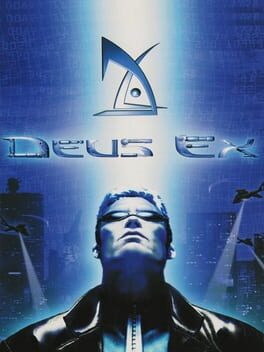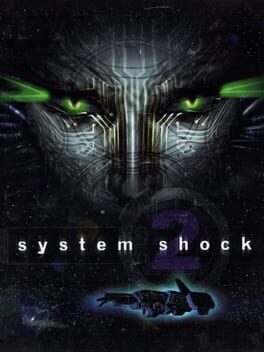Shrouls
BACKER
917 reviews liked by Shrouls
Let’s see how well you can fly on borrowed wings
Call this game V.IV Rusty, ‘cause it never fucking misses
Armored Core VI has been one of the most positive surprises I’ve had when it comes to pieces of media, and I already went into it expecting to love it or at the very least like it, mind you, but it seems that my fate wasn’t to come out of this with my expectations set ablaze and built a new.
And thing is, not really knowing the extent of what I was getting into was completely my fault, Fires of Rubicon is the sixth numbered title in the AC series and the- HOW MANY NOW?!. It’s certainly not lacking the pedigree, and yet, probably because of the 10 years of radio salience the series has gone through, and 11 of a wide-world phenomenon that has changed the videogame industry forever that is the ‘’SoulsBorne Demon Ring I, II and III: Shadows Die Twice’’ saga, my understanding to Armored Core as series wasn’t as rich as I wanted it to be, and that kinda left my expectations for IV in a weird spot .
This not to say I expected Fires of Rubicon to be ‘’just like Dark Souls’’ or something like that, I knew this was going to be completely different; I knew a bunch of stuff and how the series worked, I knew how the series worked…
Except I didn’t.
I expected a fun mech game with deep customization options. I got that, yes…
But also so, so much more.
What’re ya buyin?
Welcome to your new living space: four cold and oppressive metal walls, a store that sells weaponry that I’m pretty sure breaks every Geneva convention both existing and yet to be written down, and like 5 different disembodied voices telling you in different ways that you gotta do some killing… joy!
You make home in different bases throughout the game, but you really wouldn’t know unless the game told you, they all serve the same purpose in the end: to make your mecha the ugliest piece of junk imaginable.
I’ve heard people say that you’ll spend the same amount time buying parts and building your mech as you do going ‘’pew-pew’’ in your comically big killing machine, but I don’t think that’s entirely true. The down time and management are the spine of ACVI; there’s a reason every time you die while in a mission the game gives you the option, to change your mech, you are gonna be taking a lot of work and not every question has the same answer… but you can make them be close enough! Even when the game poses some extremely daunting challenges, you can still say ‘’fuck capitalism’’ to the store and keep trying with your current build if you feel comfortable with it, I started using a Dual- wielding medium to light build pretty early on and even after all the upgrades and changes, that idea was kept intact even after the credits rolled.
Still, the game invites you to experiment and actively rewards you: the number of possible combinations is so humongous I don’t think it’s even possible to quantify from the essential legs which can define your entire giant robot to seemingly smaller things like add on and secondary weapons, but just as equally important, every single piece counts, and you are never punished for trying stuff out. Even if you create a mech that doesn’t even make sense of whose weapons don’t synergize with each other, doesn’t matter even if you spent all your money making it, ‘cause you can always sell those suckers for the same price you got them, ‘cause there are no obstacles to have fun in war!
But even with that freedom to try and fail, I imagine many players will center around one overall idea, and how not to when the game is equally as rewarding in that way? I feared that I’d treat my mech as a sort of ship of Theseus, making builds so specific that I’d have to constantly change it to the point it was unrecognizable from what it originally was, I waited for that moment to come sooner or later… but it never really did. Even against the end boss of the first chapter, an enemy that seems scientifically designed to make new players get into the idea they need to buy new shit, and probably the boss I struggled against the most… I ended up defeating them with the ol’ and reliable.
Building up a mech is important, but it’s equally as essential to knowing them. It doesn’t really mean much to understand some numbers if on ground you don’t know how anything works, and that’s what I found fascinating about the system; a system that rewards those who wish to experiment and those who wish to perfect themselves, plowing through enemies or figuring them out, sometimes both at the same time in both cases. Even if your robot starts as a Wall-E and ends up an Mazinger Z, your relationship with it feels the same, it feels as you made it grew and change, just as much as you did as pilot with it.
And that reminds me, speaking of the battlefield…
Got a job for you, 621
Oh boy!
You know what’s better than preparing to do cool stuff? Doing the cool stuff! If by cool stuff we mean committing acts that will forever hunt our darkest nightmare and make our consciousness eat us, of course.
Fires of Rubicon is not an action game, the game is the action. You know those dumb ‘’imagine showing this to a small Victorian child’’ memes? Well, Armored Core VI is that but like if instead of ‘’Victorian child’’ was ‘’any person during any age of history, even the current one’’, and I mean that the highest compliment I could thing of. There’s so much stuff happening at every single moment at every single second that the fact is all perfectly understandable must be some kind of deep dark magic shit. The freedom in this 3D movement goes beyond giving you space to shoot and gives you some damn crazy movement options, and you either have to use them or you better have good shields, because in this battlefield nonstop attacking and quick thinking are imperative.
Bullets flowing like traces of light or giant lasers impacting at full force, it’s a constant onslaught which you WON’T come out unscathed, but certainly victorious. This is the anthesis of ‘’You only do cool shit during the cutscenes’’, because you are the cool shit, and every time a character points out how fucking insane you are I don’t feel like the game is patting me in the back, I feel like… Yeah! I actually did that cool shit! Give me that trophy I deserve it!
The variation on missions and the places you visit feels so vast and natural I really couldn’t care if they get repeated, because even when they do, if feel warranted in the broader context and it’s always so fun to repel the forces of basic mechs, destroying or defending the objectives or facing off against enemies equal to you that I kind of secretly wish there was even more of it.
Battling against other ACs is such a pleasure, and whoever came up with the idea of the Arena deserves a goddam golden medal; not only it’s a perfect excuse to ‘’meet’’ other pilots and ACs you may or may not encounter in the game, but it’s also the perfect connector to make the OS system even more rewarding and to test your abilities as well as to learn from other builds. But it’s when you get to encounter real ACs in the wild that the true dopamine starts running wild; some of the hardest battles in the entire game are those against pilots that feel like other protagonist, with access to the same crazy weaponry and the ability to heal. It’s incredibly rewarding knowing that you defeated someone that was basically another you with different equipment, almost as much as when you defeat someone that’s straight up stronger than you.
The bosses are BY A LONG SHOT the moments where the spectacle is brought to a insane degree, but never to the detriment to the fight itself. It was during the fight against the ‘’gimmick’’ boss of the game and I realized how much fun I was having, and my jaw was dropping that I knew fully that this was a damn good game. Speaking of, I wish I was recording my face when fighting against one of them, it was a crazy-ass battle that feel even more of a bullet hell than any previous one , and I managed to defeat them with only one heal left and with my resources low… and then the fucker started rising again. I felt both so betrayed and happy that I could only nervously laugh, what an amazing bunch of bosses.
If I have to point out flaws, and I do ‘cause there are two things that irked me, would be the seemingly lack of any sort of real punishment and… the lock-on system. Previous AC game featured a debt system that could put you in the red and make you have literal zero money, and while that also seemed to have its surprising gameplay ‘’benefits’’, it was a system that I totally get why it didn’t return and money lost after every mission to pay off repairs is more than enough… but I still think there should have been something that punished you, if not for your using your resources, maybe because of reckless deaths or decisions. Because not every mission has provisions to pick up ammo at a certain point, I found myself letting me be killed or resetting back to the last checkpoint, knowing not much progress would be lost and the punishment wouldn’t be much higher. I only realized this four chapters into the game, but even before that I noticed that the game too lenient considering the setting and how the rest of the world operates, and even if it’s not necessarily a flaw, it felt off in some way… you know that it’s a flaw tho?
The lock-on… isn’t the worst, once you are locked in to an enemy you are set unless it pulls off some whacky stuff, and the red reticle tells you perfectly if you are hitting the enemy or not… but getting to that point is so confusing, so poorly shown, and it’s so hard and cumbersome to change between enemies in a game so fast paced, that I couldn’t help but groan at it every time a speedy bastard attacked me from behind and by the time I was finally locked I had to spend one heal, not even the manual aim upgrade helps much in that regard…
The lock on is probably the worst part about the whole experience, and its something that doesn’t even come close to make the battles less enjoyable, and hell, sometimes I even… like it? In boss fights specially, the little bit of confusion feels warranted and makes you rely more on your control over the camera, which ends up being the right call to evade many attacks. But even when it’s noticeably bad, it will take much more than that to ruin a combat so polished, so fun, so exhilarating and exciting as this. It’s in the middle of the action when I can only think of the battle, it’s in the store when I think of the planning, and everything flows perfectly…
But it’s in those moments in the middle of nowhere, or when seeing the briefing, that I remember.
There’s a greater horror beyond the scorched skies.
A winged mutt
The first mission of the game is to wipe out entire battalion of resistance members fighting for their land, just because they are a nuisance to a conglomerate.
The next mission is to destroy that company’s forces ‘cause another conglomerate told us to.
Welcome to Rubicon.
To be honest, this particular introduction is nothing new for this series, the very first game in fact has a really similar first mission tot that of VI, and this is where my lack of knowledge comes into play since I’m not really able to compare this game’s story to that of its previous iterations in any meaningful way… but I can look it as its own.
I can’t tell you how many times I was hearing the briefing of many missions and the only thing I could picture in my mind was the CEO of Arquebus saying something along the lines of ‘’Human rights? In this economy?!’’
There’s something so uncannily real about Fires of Rubicon horror, a silenced horror beyond the great threat that a possible return of the Fires of Ibis could entail, that threat feels cosmical, a cataclysm humanity has witnessed and its terrible result… but what’s more terrifying than that is seeing two corporations grander than entire system on a race to make that happen once again, a clash to the Armageddon only stopped by their own hubris and the efforts of the rubiconians.
Entire cities covered by snow and decay, their buildings now used as cover for weapons that should have never existed, companies and the PCA creating entire edifications in mere days, in the remnants of the institute of Rubicon, a memory of a series of mistakes that costed an entire solar system. The game tells a lot of this story through briefings and mid-level conversations (Kind of Kid Icarus Uprising, now that I think about it), and it even uses this information to surprise you with the complete opposite or something unexpected, but it’s in the levels themselves, with its amazing visuals and design, where the true tragedy of Rubicon is apparent.
Fires of Rubicon is a story that branches off even beyond the credits, but one that also feels perfectly told in its first run. What I thought would be a backdrop that gives context to why are you shooting ends up being everything, and the reason you yourself question why are you shooting.
It feels so violent, more so than the hectic combat, a story of broken pasts and promises, of lies on top of lies that end up in cataclysmic results, and of those that pursue the truth end up being the most vulnerable.
You arrive with a stolen name and as a dog of many owners, to a world where nobody has a face nor a real name, where they are but numbers from a series of gens of mechs and upgrades, where those who are on top of the world don’t trust those who are a little higher on the food chain, those who don’t even show themselves, as if terrible war they started is beneath them.
Nothing matters if credits are spent; even after you begin wars against them, you still buy parts of your mech from those same companies.
Little by little, I found those to call allies, like Carla or Rusty, and those to hate, like Snail, but even in their misfortune, they at least have a voice, unlike the thousands, maybe millions, of rubiconians, as muted as their cousins of the ever-expanding coral.
But even the end, is those voices that end up joining you against a force so massive it seems impossible to know where it begins or where it ends, so inhumane that knowing people are behind it all makes it even worse, and yet, you fight, you win your wings.
You are Raven.
I love this story, I love how open ended it ends, almost inviting you to explore more, but also being hopeful if you did the right thing, if you improved and knew who to trust and what you needed to do, a story that made each battle have the more meaning, and that made the final decision and the final fight some of the most bitter sweet moments I’ve experienced in a game.
Looking back, I almost feel ashamed, I expected so much less from what it ended up being, an inspiring trust in the player, an amazing combat and movement system, a story that is as grand, as tragic, and as terrifying as it needs to be. But also even more than that.
I arrived at Rubicon not even knowing what I was gonna fight for.
Turns out, I had to find the answer for myself.
Call this game V.IV Rusty, ‘cause it never fucking misses
Armored Core VI has been one of the most positive surprises I’ve had when it comes to pieces of media, and I already went into it expecting to love it or at the very least like it, mind you, but it seems that my fate wasn’t to come out of this with my expectations set ablaze and built a new.
And thing is, not really knowing the extent of what I was getting into was completely my fault, Fires of Rubicon is the sixth numbered title in the AC series and the- HOW MANY NOW?!. It’s certainly not lacking the pedigree, and yet, probably because of the 10 years of radio salience the series has gone through, and 11 of a wide-world phenomenon that has changed the videogame industry forever that is the ‘’SoulsBorne Demon Ring I, II and III: Shadows Die Twice’’ saga, my understanding to Armored Core as series wasn’t as rich as I wanted it to be, and that kinda left my expectations for IV in a weird spot .
This not to say I expected Fires of Rubicon to be ‘’just like Dark Souls’’ or something like that, I knew this was going to be completely different; I knew a bunch of stuff and how the series worked, I knew how the series worked…
Except I didn’t.
I expected a fun mech game with deep customization options. I got that, yes…
But also so, so much more.
What’re ya buyin?
Welcome to your new living space: four cold and oppressive metal walls, a store that sells weaponry that I’m pretty sure breaks every Geneva convention both existing and yet to be written down, and like 5 different disembodied voices telling you in different ways that you gotta do some killing… joy!
You make home in different bases throughout the game, but you really wouldn’t know unless the game told you, they all serve the same purpose in the end: to make your mecha the ugliest piece of junk imaginable.
I’ve heard people say that you’ll spend the same amount time buying parts and building your mech as you do going ‘’pew-pew’’ in your comically big killing machine, but I don’t think that’s entirely true. The down time and management are the spine of ACVI; there’s a reason every time you die while in a mission the game gives you the option, to change your mech, you are gonna be taking a lot of work and not every question has the same answer… but you can make them be close enough! Even when the game poses some extremely daunting challenges, you can still say ‘’fuck capitalism’’ to the store and keep trying with your current build if you feel comfortable with it, I started using a Dual- wielding medium to light build pretty early on and even after all the upgrades and changes, that idea was kept intact even after the credits rolled.
Still, the game invites you to experiment and actively rewards you: the number of possible combinations is so humongous I don’t think it’s even possible to quantify from the essential legs which can define your entire giant robot to seemingly smaller things like add on and secondary weapons, but just as equally important, every single piece counts, and you are never punished for trying stuff out. Even if you create a mech that doesn’t even make sense of whose weapons don’t synergize with each other, doesn’t matter even if you spent all your money making it, ‘cause you can always sell those suckers for the same price you got them, ‘cause there are no obstacles to have fun in war!
But even with that freedom to try and fail, I imagine many players will center around one overall idea, and how not to when the game is equally as rewarding in that way? I feared that I’d treat my mech as a sort of ship of Theseus, making builds so specific that I’d have to constantly change it to the point it was unrecognizable from what it originally was, I waited for that moment to come sooner or later… but it never really did. Even against the end boss of the first chapter, an enemy that seems scientifically designed to make new players get into the idea they need to buy new shit, and probably the boss I struggled against the most… I ended up defeating them with the ol’ and reliable.
Building up a mech is important, but it’s equally as essential to knowing them. It doesn’t really mean much to understand some numbers if on ground you don’t know how anything works, and that’s what I found fascinating about the system; a system that rewards those who wish to experiment and those who wish to perfect themselves, plowing through enemies or figuring them out, sometimes both at the same time in both cases. Even if your robot starts as a Wall-E and ends up an Mazinger Z, your relationship with it feels the same, it feels as you made it grew and change, just as much as you did as pilot with it.
And that reminds me, speaking of the battlefield…
Got a job for you, 621
Oh boy!
You know what’s better than preparing to do cool stuff? Doing the cool stuff! If by cool stuff we mean committing acts that will forever hunt our darkest nightmare and make our consciousness eat us, of course.
Fires of Rubicon is not an action game, the game is the action. You know those dumb ‘’imagine showing this to a small Victorian child’’ memes? Well, Armored Core VI is that but like if instead of ‘’Victorian child’’ was ‘’any person during any age of history, even the current one’’, and I mean that the highest compliment I could thing of. There’s so much stuff happening at every single moment at every single second that the fact is all perfectly understandable must be some kind of deep dark magic shit. The freedom in this 3D movement goes beyond giving you space to shoot and gives you some damn crazy movement options, and you either have to use them or you better have good shields, because in this battlefield nonstop attacking and quick thinking are imperative.
Bullets flowing like traces of light or giant lasers impacting at full force, it’s a constant onslaught which you WON’T come out unscathed, but certainly victorious. This is the anthesis of ‘’You only do cool shit during the cutscenes’’, because you are the cool shit, and every time a character points out how fucking insane you are I don’t feel like the game is patting me in the back, I feel like… Yeah! I actually did that cool shit! Give me that trophy I deserve it!
The variation on missions and the places you visit feels so vast and natural I really couldn’t care if they get repeated, because even when they do, if feel warranted in the broader context and it’s always so fun to repel the forces of basic mechs, destroying or defending the objectives or facing off against enemies equal to you that I kind of secretly wish there was even more of it.
Battling against other ACs is such a pleasure, and whoever came up with the idea of the Arena deserves a goddam golden medal; not only it’s a perfect excuse to ‘’meet’’ other pilots and ACs you may or may not encounter in the game, but it’s also the perfect connector to make the OS system even more rewarding and to test your abilities as well as to learn from other builds. But it’s when you get to encounter real ACs in the wild that the true dopamine starts running wild; some of the hardest battles in the entire game are those against pilots that feel like other protagonist, with access to the same crazy weaponry and the ability to heal. It’s incredibly rewarding knowing that you defeated someone that was basically another you with different equipment, almost as much as when you defeat someone that’s straight up stronger than you.
The bosses are BY A LONG SHOT the moments where the spectacle is brought to a insane degree, but never to the detriment to the fight itself. It was during the fight against the ‘’gimmick’’ boss of the game and I realized how much fun I was having, and my jaw was dropping that I knew fully that this was a damn good game. Speaking of, I wish I was recording my face when fighting against one of them, it was a crazy-ass battle that feel even more of a bullet hell than any previous one , and I managed to defeat them with only one heal left and with my resources low… and then the fucker started rising again. I felt both so betrayed and happy that I could only nervously laugh, what an amazing bunch of bosses.
If I have to point out flaws, and I do ‘cause there are two things that irked me, would be the seemingly lack of any sort of real punishment and… the lock-on system. Previous AC game featured a debt system that could put you in the red and make you have literal zero money, and while that also seemed to have its surprising gameplay ‘’benefits’’, it was a system that I totally get why it didn’t return and money lost after every mission to pay off repairs is more than enough… but I still think there should have been something that punished you, if not for your using your resources, maybe because of reckless deaths or decisions. Because not every mission has provisions to pick up ammo at a certain point, I found myself letting me be killed or resetting back to the last checkpoint, knowing not much progress would be lost and the punishment wouldn’t be much higher. I only realized this four chapters into the game, but even before that I noticed that the game too lenient considering the setting and how the rest of the world operates, and even if it’s not necessarily a flaw, it felt off in some way… you know that it’s a flaw tho?
The lock-on… isn’t the worst, once you are locked in to an enemy you are set unless it pulls off some whacky stuff, and the red reticle tells you perfectly if you are hitting the enemy or not… but getting to that point is so confusing, so poorly shown, and it’s so hard and cumbersome to change between enemies in a game so fast paced, that I couldn’t help but groan at it every time a speedy bastard attacked me from behind and by the time I was finally locked I had to spend one heal, not even the manual aim upgrade helps much in that regard…
The lock on is probably the worst part about the whole experience, and its something that doesn’t even come close to make the battles less enjoyable, and hell, sometimes I even… like it? In boss fights specially, the little bit of confusion feels warranted and makes you rely more on your control over the camera, which ends up being the right call to evade many attacks. But even when it’s noticeably bad, it will take much more than that to ruin a combat so polished, so fun, so exhilarating and exciting as this. It’s in the middle of the action when I can only think of the battle, it’s in the store when I think of the planning, and everything flows perfectly…
But it’s in those moments in the middle of nowhere, or when seeing the briefing, that I remember.
There’s a greater horror beyond the scorched skies.
A winged mutt
The first mission of the game is to wipe out entire battalion of resistance members fighting for their land, just because they are a nuisance to a conglomerate.
The next mission is to destroy that company’s forces ‘cause another conglomerate told us to.
Welcome to Rubicon.
To be honest, this particular introduction is nothing new for this series, the very first game in fact has a really similar first mission tot that of VI, and this is where my lack of knowledge comes into play since I’m not really able to compare this game’s story to that of its previous iterations in any meaningful way… but I can look it as its own.
I can’t tell you how many times I was hearing the briefing of many missions and the only thing I could picture in my mind was the CEO of Arquebus saying something along the lines of ‘’Human rights? In this economy?!’’
There’s something so uncannily real about Fires of Rubicon horror, a silenced horror beyond the great threat that a possible return of the Fires of Ibis could entail, that threat feels cosmical, a cataclysm humanity has witnessed and its terrible result… but what’s more terrifying than that is seeing two corporations grander than entire system on a race to make that happen once again, a clash to the Armageddon only stopped by their own hubris and the efforts of the rubiconians.
Entire cities covered by snow and decay, their buildings now used as cover for weapons that should have never existed, companies and the PCA creating entire edifications in mere days, in the remnants of the institute of Rubicon, a memory of a series of mistakes that costed an entire solar system. The game tells a lot of this story through briefings and mid-level conversations (Kind of Kid Icarus Uprising, now that I think about it), and it even uses this information to surprise you with the complete opposite or something unexpected, but it’s in the levels themselves, with its amazing visuals and design, where the true tragedy of Rubicon is apparent.
Fires of Rubicon is a story that branches off even beyond the credits, but one that also feels perfectly told in its first run. What I thought would be a backdrop that gives context to why are you shooting ends up being everything, and the reason you yourself question why are you shooting.
It feels so violent, more so than the hectic combat, a story of broken pasts and promises, of lies on top of lies that end up in cataclysmic results, and of those that pursue the truth end up being the most vulnerable.
You arrive with a stolen name and as a dog of many owners, to a world where nobody has a face nor a real name, where they are but numbers from a series of gens of mechs and upgrades, where those who are on top of the world don’t trust those who are a little higher on the food chain, those who don’t even show themselves, as if terrible war they started is beneath them.
Nothing matters if credits are spent; even after you begin wars against them, you still buy parts of your mech from those same companies.
Little by little, I found those to call allies, like Carla or Rusty, and those to hate, like Snail, but even in their misfortune, they at least have a voice, unlike the thousands, maybe millions, of rubiconians, as muted as their cousins of the ever-expanding coral.
But even the end, is those voices that end up joining you against a force so massive it seems impossible to know where it begins or where it ends, so inhumane that knowing people are behind it all makes it even worse, and yet, you fight, you win your wings.
You are Raven.
I love this story, I love how open ended it ends, almost inviting you to explore more, but also being hopeful if you did the right thing, if you improved and knew who to trust and what you needed to do, a story that made each battle have the more meaning, and that made the final decision and the final fight some of the most bitter sweet moments I’ve experienced in a game.
Looking back, I almost feel ashamed, I expected so much less from what it ended up being, an inspiring trust in the player, an amazing combat and movement system, a story that is as grand, as tragic, and as terrifying as it needs to be. But also even more than that.
I arrived at Rubicon not even knowing what I was gonna fight for.
Turns out, I had to find the answer for myself.
Borderlands 2
2012
Darkwood
2017
This review contains spoilers
I couldn't stop thinking about this game for weeks after first playing it. Everyone's already talked about its impeccable atmosphere and horror, and I agree with all of it and can't word it as well as others, so I wanna talk about the story aspects that have haunted me.
It has such... a like.. see its atmosphere would feel utterly hopeless in normal circumstances, I feel like, right? But it's not, somehow. At least not to me. Maybe that's because of the hope that underlines so many parts of it - but the thing about that hope is that it's false. And the thing about that, is that.. It's not presented to you like it is. It's simply presented to you as hope. It's up to you, the player, not the protagonist, to figure out that it's false. And I think that sort of deal with perception is really skillfully done.
I keep thinking about how interesting it is that you're playing a doomed protagonist. From the start you are infected and you know deep down from observing your surroundings that there is no getting out of that. You are doomed. Your only options are to die either a man or a beast - as much as you are able to control this, anyway.
Ex: you may know this, but you still witness the protagonist hoping and hoping to go home. You move him forward for the sake of that goal of going home. And you're never told this - but you know - What's waiting for him, if he does get home? He's already infected. That's not his home anymore. (you know this of many inhabitants, like the musician, and yet..)
I think the true ending encapsulates this very well... I like that the ending variation has nothing to do with the choices you made along the way. It has to do, rather, with whether or not you, the player, can see through the illusion of a happy ending. The epilogue is a mind trick on both you and the protagonist. It would make sense narratively speaking, after all-- this is the end. It's what you've been working for all this time. This is how stories go, you toiled and bled and now you're finally there; the happy ending. But you know. You know something's not right.
It's about whether or not you're willing to accept that. For the protagonist as well, I think ... And I think there lies the fact that keeps it all from being utterly hopeless - if you can bring yourself to accept that your story has no happy ending, you can put an end to all the suffering and horrors you endured so that no one else has to suffer the same bad end you did. And that, in itself .. feels more like hope.. It wasn't all pointless. It wasn't all suffering for the sake of suffering. It wasn't fair, but you can put a stop to that injustice, even if you can't see the fruits of your labor yourself...
I'm also a big fan of the environmental storytelling. I love things being left to you to put together like this, how many things you're given all the pieces for but aren't pointed out to you directly by the narration or protagonist or anything - like being shown how the Being creates mushroom copies of its inhabitants, and then seeing later the trader's belongings all mirroring yours and bearing that same sticky, bleached, warped appearance, and so many things about his existence and presence clicking into place within your own head from this quiet, optional presentation to you - so many things are presented to you like this, and it feels more like uncovering a mystery than cryptic weirdness without a meaning, which I really enjoy.
...Also, I liked that the easy mode made it so even a dumbass like me who sucks at video games could play it through to the end, but still retained its fear factor and difficulty. I think this was the best horror experience I've had in recent memory, maybe ever.
(also also, I really like the Being's behavior being so much like a giant mushroom taken to an extreme, in multiple forms. It's really cool to realize in hindsight and then see how that shows throughout everything.)
It has such... a like.. see its atmosphere would feel utterly hopeless in normal circumstances, I feel like, right? But it's not, somehow. At least not to me. Maybe that's because of the hope that underlines so many parts of it - but the thing about that hope is that it's false. And the thing about that, is that.. It's not presented to you like it is. It's simply presented to you as hope. It's up to you, the player, not the protagonist, to figure out that it's false. And I think that sort of deal with perception is really skillfully done.
I keep thinking about how interesting it is that you're playing a doomed protagonist. From the start you are infected and you know deep down from observing your surroundings that there is no getting out of that. You are doomed. Your only options are to die either a man or a beast - as much as you are able to control this, anyway.
Ex: you may know this, but you still witness the protagonist hoping and hoping to go home. You move him forward for the sake of that goal of going home. And you're never told this - but you know - What's waiting for him, if he does get home? He's already infected. That's not his home anymore. (you know this of many inhabitants, like the musician, and yet..)
I think the true ending encapsulates this very well... I like that the ending variation has nothing to do with the choices you made along the way. It has to do, rather, with whether or not you, the player, can see through the illusion of a happy ending. The epilogue is a mind trick on both you and the protagonist. It would make sense narratively speaking, after all-- this is the end. It's what you've been working for all this time. This is how stories go, you toiled and bled and now you're finally there; the happy ending. But you know. You know something's not right.
It's about whether or not you're willing to accept that. For the protagonist as well, I think ... And I think there lies the fact that keeps it all from being utterly hopeless - if you can bring yourself to accept that your story has no happy ending, you can put an end to all the suffering and horrors you endured so that no one else has to suffer the same bad end you did. And that, in itself .. feels more like hope.. It wasn't all pointless. It wasn't all suffering for the sake of suffering. It wasn't fair, but you can put a stop to that injustice, even if you can't see the fruits of your labor yourself...
I'm also a big fan of the environmental storytelling. I love things being left to you to put together like this, how many things you're given all the pieces for but aren't pointed out to you directly by the narration or protagonist or anything - like being shown how the Being creates mushroom copies of its inhabitants, and then seeing later the trader's belongings all mirroring yours and bearing that same sticky, bleached, warped appearance, and so many things about his existence and presence clicking into place within your own head from this quiet, optional presentation to you - so many things are presented to you like this, and it feels more like uncovering a mystery than cryptic weirdness without a meaning, which I really enjoy.
...Also, I liked that the easy mode made it so even a dumbass like me who sucks at video games could play it through to the end, but still retained its fear factor and difficulty. I think this was the best horror experience I've had in recent memory, maybe ever.
(also also, I really like the Being's behavior being so much like a giant mushroom taken to an extreme, in multiple forms. It's really cool to realize in hindsight and then see how that shows throughout everything.)
Heavy Rain
2010
Inside
2016
This review contains spoilers
I’ve been waiting awhile to play this; I just never got around to it. I was a fan of Limbo back in the day, so I’m glad that the aesthetic has been built upon in this game. Inside is dark and brooding; it’s oppressive in its atmosphere of despair.
I do like the cancer allegory; I know many don’t really buy it, but it’s definitely all there for me, where I felt it wasn’t humans attacking me but rounds and rounds of chemotherapy. culminating in what can only be described as a tumour running on a mass of limbs that would make John Carpenter proud.
This game resonated with me. I don’t mean to make light of a heavy subject, but I really did find the game oppressive and defeatist, but there is beauty in this game still. I played it again soon after beating it to make sure I was catching everything. It can be interpreted in a myriad of ways, as can be said of the best art.
I do like the cancer allegory; I know many don’t really buy it, but it’s definitely all there for me, where I felt it wasn’t humans attacking me but rounds and rounds of chemotherapy. culminating in what can only be described as a tumour running on a mass of limbs that would make John Carpenter proud.
This game resonated with me. I don’t mean to make light of a heavy subject, but I really did find the game oppressive and defeatist, but there is beauty in this game still. I played it again soon after beating it to make sure I was catching everything. It can be interpreted in a myriad of ways, as can be said of the best art.
Bloodborne
2015
Darkwood
2017
spoilers
At first glance, this seems like a largely frivolous mashup, the Pride & Prejudice & Zombies of gaming, a modern successor to old b-movie fodder like 1966’s Billy the Kid Versus Dracula. Look a little deeper, though, and it’s clear that Undead Nightmare’s Weird West skin is a vessel for further analysis of the western as a genre. The ending in particular is quite damning of the whole idea of the western expansion and Manifest Destiny, the lingering effects of colonialism plunging the world into chaos. By the end, Marston returns the stolen Aztec mask which caused the zombie outbreak, and all seems well. However, the grave-robber character Seth rushes back into the crypt and steals the tribal artifact once again, reigniting the zombie plague. Even when there’s an easy, obvious solution to the problem, the settler population continues to desecrate native cultures and fuck everything up all over again, in a seemingly inescapable cycle.
One of the most striking moments in this expansion is the Sasquatch hunt sidequest. A farmer tells you that there’s a bunch of Sasquatches going around eating babies. Marston sets off in search of them, killing the mythical creatures without much second thought, as they are other and look more like animals than humans. Once you get to the final Sasquatch, though, he begs you to kill him, speaking quite fluently and maligning that his entire species has been hunted down and killed. It’s terrifying how easy it is here to dehumanise another group and wipe them out, a deeply disturbing allegory for the treatment of Native Americans throughout the western era (which continues today in a myriad of ways). It’s a totally surreal scenario, yet its underlying theme is just as real and relevant as anything the main game provided.
Gameplay wise, the basic mechanics are about the same as the main game: you have an array of bolt-action, lever-action, and semi-automatic weaponry, along with a couple of throwable explosives. The third person, auto-lock targeting system where headshots are top priority plays out basically the same as Grand Theft Auto V, aside from the different arsenal. There’s also a bullet time feature, as with the main game, but here you get it at max level from the start, encouraging you to use it far more. There’s a couple of new weapons, but most of them are in fairly short supply and don’t shake up the formula too drastically.
The other main difference from the base game in this respect is the zombies themselves. They’re slow, lumbering things that walk out in the open. Cover is basically useless here, instead you’ll be running and gunning your way through zombie hordes. The emphasis on headshots is even greater, as body shots don’t do much to keep the zombies down. I actually find this combat a lot more enjoyable than the main game, though it’s a tad too easy most of the time. The game claims that ammo is scarce and you should conserve your bullets, but beyond the first town or two that was never really an issue for me.
The main structure of the game involves you roaming from town to town, clearing out the zombies to help the survivors and then doing a variety of sidequests for them. There are a few “main” missions, and in typical Rockstar fashion some of these are quite heavily scripted, but overall this looser format gives the player far more gameplay freedom than their other recent titles. It does get a little repetitive at times, though, especially once you get to Mexico and there’s not really much further amping up the stakes. The structure of the narrative as a whole feels somewhat slapdash and thrown together, leaning heavily on established relationships from the base game, giving each major player a quick quest or two, and then on to the next town.
Even though there’s plenty of great individual moments here, they don’t really form much of a coherent whole, at least from a character or plot perspective. The one thing that ties it all together is how most of the survivors, instead of banding together, dig themselves even deeper into their own prejudices, blaming the apocalypse on everything from Mexicans to Jews to African Americans and beyond. It’s an eerie echo of increasing tensions in the world right now, decades of prejudice and mistreatment once again bubbling to the surface of popular culture.
It’s also quite entertaining to see how fed up with all this shit Marston is, he even deliberately lets a couple of racist dickheads get eaten by zombies when he easily could have saved them, and threatens people at gunpoint several times. Unlike the main game, where he was framed as a redeemable character trying to be a better person, he’s just totally done and letting his violent instincts takeover, and this characterization fits way better with Rockstar’s misanthropic satire. There were many annoying characters who I just wanted to pull a gun on and get it over with in the main campaign, and it’s very satisfying to see Marston finally line up with that (does this make me a bad person?).
If the main game drove home that by 1911, the west is pretty much dead and the cowboy life became totally unsustainable, this explores the one way in which cowboys could’ve been relevant again: a total stop in societal progress by means of a zombie apocalypse. As grim and fed up as Marston becomes, there’s a perverse pleasure in returning to the gun-slinging and horseback-riding ways of old that’s not lost on him, nor the player (nor on Rockstar, it would seem, who had to rewind time itself to for Red Dead Redemption 2 to be possible). The apocalypse destroys the very world which Marston, Dutch, and co are hopelessly railing against, giving them one last chance to be outlaws again, even if it costs the entire world.
At first glance, this seems like a largely frivolous mashup, the Pride & Prejudice & Zombies of gaming, a modern successor to old b-movie fodder like 1966’s Billy the Kid Versus Dracula. Look a little deeper, though, and it’s clear that Undead Nightmare’s Weird West skin is a vessel for further analysis of the western as a genre. The ending in particular is quite damning of the whole idea of the western expansion and Manifest Destiny, the lingering effects of colonialism plunging the world into chaos. By the end, Marston returns the stolen Aztec mask which caused the zombie outbreak, and all seems well. However, the grave-robber character Seth rushes back into the crypt and steals the tribal artifact once again, reigniting the zombie plague. Even when there’s an easy, obvious solution to the problem, the settler population continues to desecrate native cultures and fuck everything up all over again, in a seemingly inescapable cycle.
One of the most striking moments in this expansion is the Sasquatch hunt sidequest. A farmer tells you that there’s a bunch of Sasquatches going around eating babies. Marston sets off in search of them, killing the mythical creatures without much second thought, as they are other and look more like animals than humans. Once you get to the final Sasquatch, though, he begs you to kill him, speaking quite fluently and maligning that his entire species has been hunted down and killed. It’s terrifying how easy it is here to dehumanise another group and wipe them out, a deeply disturbing allegory for the treatment of Native Americans throughout the western era (which continues today in a myriad of ways). It’s a totally surreal scenario, yet its underlying theme is just as real and relevant as anything the main game provided.
Gameplay wise, the basic mechanics are about the same as the main game: you have an array of bolt-action, lever-action, and semi-automatic weaponry, along with a couple of throwable explosives. The third person, auto-lock targeting system where headshots are top priority plays out basically the same as Grand Theft Auto V, aside from the different arsenal. There’s also a bullet time feature, as with the main game, but here you get it at max level from the start, encouraging you to use it far more. There’s a couple of new weapons, but most of them are in fairly short supply and don’t shake up the formula too drastically.
The other main difference from the base game in this respect is the zombies themselves. They’re slow, lumbering things that walk out in the open. Cover is basically useless here, instead you’ll be running and gunning your way through zombie hordes. The emphasis on headshots is even greater, as body shots don’t do much to keep the zombies down. I actually find this combat a lot more enjoyable than the main game, though it’s a tad too easy most of the time. The game claims that ammo is scarce and you should conserve your bullets, but beyond the first town or two that was never really an issue for me.
The main structure of the game involves you roaming from town to town, clearing out the zombies to help the survivors and then doing a variety of sidequests for them. There are a few “main” missions, and in typical Rockstar fashion some of these are quite heavily scripted, but overall this looser format gives the player far more gameplay freedom than their other recent titles. It does get a little repetitive at times, though, especially once you get to Mexico and there’s not really much further amping up the stakes. The structure of the narrative as a whole feels somewhat slapdash and thrown together, leaning heavily on established relationships from the base game, giving each major player a quick quest or two, and then on to the next town.
Even though there’s plenty of great individual moments here, they don’t really form much of a coherent whole, at least from a character or plot perspective. The one thing that ties it all together is how most of the survivors, instead of banding together, dig themselves even deeper into their own prejudices, blaming the apocalypse on everything from Mexicans to Jews to African Americans and beyond. It’s an eerie echo of increasing tensions in the world right now, decades of prejudice and mistreatment once again bubbling to the surface of popular culture.
It’s also quite entertaining to see how fed up with all this shit Marston is, he even deliberately lets a couple of racist dickheads get eaten by zombies when he easily could have saved them, and threatens people at gunpoint several times. Unlike the main game, where he was framed as a redeemable character trying to be a better person, he’s just totally done and letting his violent instincts takeover, and this characterization fits way better with Rockstar’s misanthropic satire. There were many annoying characters who I just wanted to pull a gun on and get it over with in the main campaign, and it’s very satisfying to see Marston finally line up with that (does this make me a bad person?).
If the main game drove home that by 1911, the west is pretty much dead and the cowboy life became totally unsustainable, this explores the one way in which cowboys could’ve been relevant again: a total stop in societal progress by means of a zombie apocalypse. As grim and fed up as Marston becomes, there’s a perverse pleasure in returning to the gun-slinging and horseback-riding ways of old that’s not lost on him, nor the player (nor on Rockstar, it would seem, who had to rewind time itself to for Red Dead Redemption 2 to be possible). The apocalypse destroys the very world which Marston, Dutch, and co are hopelessly railing against, giving them one last chance to be outlaws again, even if it costs the entire world.
I've got a thousand problems with this game, but I can't bring myself to give it anything but 5 stars. it just does stuff that no other game does, and the best bits of it are so easy to love. I am still surprised by this, but Arthur Morgan is my favorite character in any video game. brilliant writing and tremendous scope.
This review contains spoilers
Red Dead Redemption 2 is an odd game to review. At times it is some of Rockstars best work with a terrific setting and one of the best written protagonists with Arthur Morgan. But at the very same time it is a painfully linear experience that can't help but take control from the player for seemingly no reason, with some of the clunkiest gameplay mechanics I've seen in the last five years, further marred by being oddly rushed at points in its expansive story.
RDR2s single best aspect would absolutely be its characters and writing, with my favorite sections in particular belonging to the beginning and end of the ride. Seeing Arthur Morgan and the Van Der Linde gang transform from infamous criminals fighting an unjust society to petty thugs just trying to survive in a world that does not want them is painfully tragic. Arthurs arc in particular is my absolute favorite that R has done, with scenes such as the conversation with the Nun and all of the final mission making me bawl my eyes out in how perfect they were. This expertly crafted story is further supported by an open world that feels really fun to explore, filled with tons of fun activities like poker and five finger fillet that will make you lose dozens of hours in alone. Final thing i'll note is the music absolutely lands the home run, fitting the setting and moments perfectly, with both Unshaken and Cruel World standing out as some of the best examples on how vocal tracks can elevate the scene to legendary status.
While I can sing the praises all day long, the simple reason as to why RDR2 is not a perfect game and FAR from the GOTY status that some people give it is simply due to how fucking dogshit Rockstars modern mission structure is. So much as sneeze in the wrong direction and the game will game over your ass forcing a restart at one of the games inconsistent checkpoints. Sometimes things are real simple and you'll have to replay a few minutes while others will force THE ENTIRE FUCKING MISSION to be reset (which I circumvented by using the incredibly helpful skip checkpoint option because fuck you Rockstar). It's frustrating because some of the more linear missions are some of my favorites but the amount of them and how much hand holding is forced onto the player is agonizing and permeates throughout the entire experience. This frustration sadly continues with the general gameplay feeling extremely outdated at times, with the shooting feeling incredibly awkward at times and simple mechanics like menu navigation feeling increasingly cumbersome for no apparent reason. It's one thing to have an intentionally slow pace but making simple things such as enemy looting or using Fast Travel a hassle is unforgivable. Last thing I'd like to go into detail with is how rushed certain aspects of the story feel, mainly with the middle and Dutch. While I do enjoy Chapters 1-3 and 6-Epilogue, Saint Denis and ESPECIALLY Guarma feel like the writers remembered it was a prequel and had to blitz through making issues for the gang. Dutch's transformation to the tough but fair boss to the paranoid crazy person feels incredibly rushed with only two real missions signifying a change, and the entirety of Guarma is a dogshit retread of RDR1s phenomenal Mexico section that feels like a poor attempt to rush Arthurs TB and pad out an already slow experience. One of the worst chapters I've had to experience in gaming and a low point for Rockstar as a company.
With all that being said I'd highly recommend Red Dead Redemption 2 to anyone looking for a Western or just a slow paced Open World game. PC Port is a pretty solid way to experience things but even on Consoles the experience is one you can't miss out on. One of R's best but I'd still take the original and Undead Nightmare any day of the week.
8.5/10
RDR2s single best aspect would absolutely be its characters and writing, with my favorite sections in particular belonging to the beginning and end of the ride. Seeing Arthur Morgan and the Van Der Linde gang transform from infamous criminals fighting an unjust society to petty thugs just trying to survive in a world that does not want them is painfully tragic. Arthurs arc in particular is my absolute favorite that R has done, with scenes such as the conversation with the Nun and all of the final mission making me bawl my eyes out in how perfect they were. This expertly crafted story is further supported by an open world that feels really fun to explore, filled with tons of fun activities like poker and five finger fillet that will make you lose dozens of hours in alone. Final thing i'll note is the music absolutely lands the home run, fitting the setting and moments perfectly, with both Unshaken and Cruel World standing out as some of the best examples on how vocal tracks can elevate the scene to legendary status.
While I can sing the praises all day long, the simple reason as to why RDR2 is not a perfect game and FAR from the GOTY status that some people give it is simply due to how fucking dogshit Rockstars modern mission structure is. So much as sneeze in the wrong direction and the game will game over your ass forcing a restart at one of the games inconsistent checkpoints. Sometimes things are real simple and you'll have to replay a few minutes while others will force THE ENTIRE FUCKING MISSION to be reset (which I circumvented by using the incredibly helpful skip checkpoint option because fuck you Rockstar). It's frustrating because some of the more linear missions are some of my favorites but the amount of them and how much hand holding is forced onto the player is agonizing and permeates throughout the entire experience. This frustration sadly continues with the general gameplay feeling extremely outdated at times, with the shooting feeling incredibly awkward at times and simple mechanics like menu navigation feeling increasingly cumbersome for no apparent reason. It's one thing to have an intentionally slow pace but making simple things such as enemy looting or using Fast Travel a hassle is unforgivable. Last thing I'd like to go into detail with is how rushed certain aspects of the story feel, mainly with the middle and Dutch. While I do enjoy Chapters 1-3 and 6-Epilogue, Saint Denis and ESPECIALLY Guarma feel like the writers remembered it was a prequel and had to blitz through making issues for the gang. Dutch's transformation to the tough but fair boss to the paranoid crazy person feels incredibly rushed with only two real missions signifying a change, and the entirety of Guarma is a dogshit retread of RDR1s phenomenal Mexico section that feels like a poor attempt to rush Arthurs TB and pad out an already slow experience. One of the worst chapters I've had to experience in gaming and a low point for Rockstar as a company.
With all that being said I'd highly recommend Red Dead Redemption 2 to anyone looking for a Western or just a slow paced Open World game. PC Port is a pretty solid way to experience things but even on Consoles the experience is one you can't miss out on. One of R's best but I'd still take the original and Undead Nightmare any day of the week.
8.5/10

